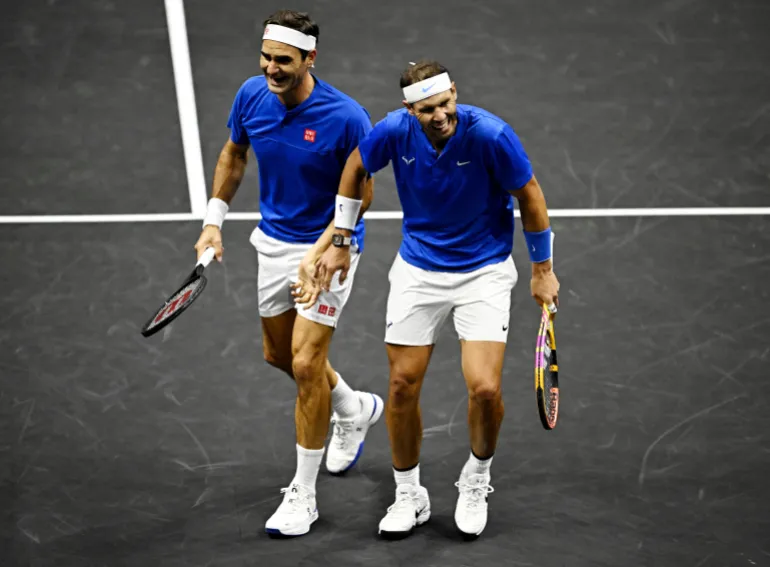The Dance of Competitive Rivalry

On Rivalry, Emotion, and Humanity: Reflections in the Age of AI
I’ve never been particularly competitive. In school, I realized early on that competition often came at a cost—someone always got hurt. So, I chose a simpler path: get just enough marks, enjoy the companionship, and let the rest take care of itself. It wasn’t the “right” way, perhaps, but it worked for me. Life felt peaceful, joyful even.
But something stirred in me last year, watching Roger Federer and Rafael Nadal play their final match together—an iconic farewell to Federer. I don’t follow tennis closely, but their rivalry always intrigued me. Nadal, the relentless fighter, had my admiration. Federer? For reasons I couldn’t quite explain, he always felt like the villain to me. Maybe it was his elegance, his seeming ease, that made it feel like he had an unfair advantage over Nadal’s grit.
That match changed everything. Their camaraderie on the court, the raw emotions as Federer said goodbye—it all felt profoundly human. It wasn’t just about winning or losing anymore. It was about what they had built together: a rivalry that had pushed them to unimaginable heights and, paradoxically, forged a deep bond of respect and friendship.
I felt something similar watching Rush, the movie about the rivalry between James Hunt and Niki Lauda. Their story, too, was about more than just competition. It was about growth, challenge, and finding oneself through another.
A wise man can learn more from his enemies than a fool from his friends – Niki Lauda
The sum of life needs to be pleasure. What’s the point of having a million of medals, cups and planes if you don’t have any fun? And how is that winning? – James Hunt
We often hear that the best competition is with oneself, and I believe that. It’s a peaceful, long-term philosophy. But let’s be honest—nothing brings out your best like a worthy opponent. Rivalry, when it’s healthy, can be a mirror reflecting your potential, pushing you beyond limits you didn’t even know existed.
Interestingly, I’m competitive when I play games or sports, but I’ve never brought that energy to work or academics. I’d much rather be part of a group that supports each other, where shared goals take precedence over individual glory. Those moments of companionship—helping one another through challenges—feel far more meaningful to me than winning a solo race.
While I appreciate the value of healthy competition in certain contexts, I’ve never enjoyed how some employers use competitiveness to squeeze more work out of people. Pitting colleagues against one another might drive short-term results, but it often damages the collaborative spirit. A workplace thrives on teamwork, not rivalry. When people work together, supporting each other toward shared goals, the outcome isn’t just better productivity—it’s a more humane and fulfilling environment.
That’s why I’ve always gravitated toward fostering a sense of companionship at work. It’s comforting, motivating, and something to be genuinely grateful for. After all, isn’t the real success found in lifting each other up?
But the world is changing. Friends move on, people settle into new phases of life, and connections fray. Social media only deepens the divide, painting a glossy facade of relationships while fostering a culture of FOMO. Genuine human bonds are harder to maintain.
And yet, moments like Federer’s heartfelt tweet to Nadal remind me of what’s real. Rivalry, stripped of ego, reveals something beautiful: our shared humanity. It’s a reminder that even in a world driven by metrics and performance, emotions—those chemical reactions that make us human—are what truly connect us.
Vamos, @RafaelNadal!
— Roger Federer (@rogerfederer) November 19, 2024
As you get ready to graduate from tennis, I’ve got a few things to share before I maybe get emotional.
Let’s start with the obvious: you beat me—a lot. More than I managed to beat you. You challenged me in ways no one else could. On clay, it felt like I…
There was a time when I shied away from emotions, believing they were a sign of weakness. But now, in an age dominated by AI and technology, I see their value more than ever. AI might mimic human interactions, but it can’t truly feel. It can’t grasp the complexity of a Federer-Nadal moment or the depth of a Hunt-Lauda rivalry. These emotions—raw, messy, and real—are uniquely ours.
Reading Advaita Vedanta has helped me temper anger and embrace perspective. Why waste energy on rage when, in the grand cosmic scale, everything—our struggles, our victories, our rivalries—will fade into nothingness? The universe will reset, and so will we.
Yet, in the here and now, emotions anchor us. They teach us, challenge us, and connect us. Rivalry, whether in sports, work, or life, isn’t just about outdoing another—it’s about discovering what we’re capable of, and sometimes, finding unexpected friendship along the way.
So here’s to rivalry—not as a battle to conquer, but as a journey to grow. To feel, to struggle, to connect. And to remember that, in the end, it’s these shared human experiences that make life worth living.
PS: I do need to research on Novak Djokovic. His gameplay is incredible and is very funny. He plays the game, he is not fighting a war. I have not watched him alot but i do like his style. Funny guy.
Picture Source: https://www.aljazeera.com/news/2022/9/24/roger-federers-last-match-is-doubles-loss-with-rafael